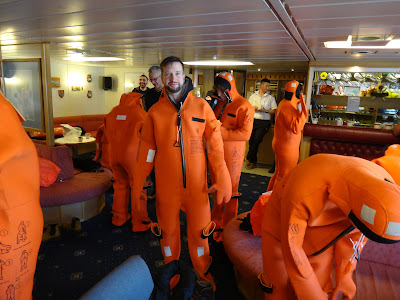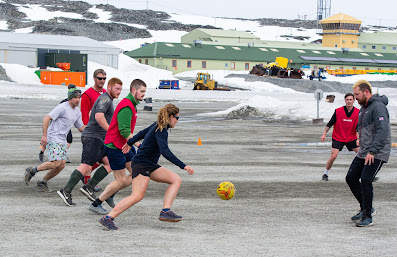It has been an extraordinary week. Breaking the quarantine bubble was a huge relief as we stepped off the bus into the port of Harwich. We lugged our baggage onto the quay and awaited our names to be called. Multiple journeys between the quay and the ship were necessary for those that had packed an abundant supply of entertainment and clothes in preparation for our epic voyage crossing the Atlantic and into the Southern Ocean. Upon boarding the James Clark Ross, hereafter JCR, we were assigned to shared cabins- I was put into a spacious 4 berth cabin with three other lovely female colleagues. There was certainly a buzz as the canteen filled with people and many were delighted to finally hug each other! Our first lunch was plentiful with an incredible array of cold pizzas, potato salad and plum tomatoes. I couldn't help wonder how long this fresh food would last for as I was crunching through a salad leaf. Before we could even question how to occupy our time, we were given a crash course in using life jacks and immersion suits which some of us had great fun donning! Later that afternoon, an emergency drill ensued and we mustered at our designated stations before being escorted into the life boats. I was astonished as to how spacious they were, I could easily stand up and look across at rows of benches with enough space to fully extend my legs. We got the feel for strapping ourselves into our harnesses and ran through the evacuation procedure in case of emergency. I was quite disappointed that the life boats were actually not going to be deployed...

Donning our emersion suits for good fit. Photo credit: Ed Luke
Amazingly, out of the 70 people that endured 14 days of quarantine, not a single person contracted Covid-19 and, as I write, 13 days into the voyage, everyone is safe. However, mitigation strategies remain in place and the chief scientist's cabin remains unoccupied to isolate anybody in the event of developing any Covid-19 symptoms.

First sighting of the JCR
Our spacious 4 berth cabin with a sea view
We set sail at 09:30 the next morning and the monkey island (the highest accessible point on the ship) burst into life as we all gathered to wave goodbye to vegetated land! Final phone calls were made whilst we still had signal and then the ropes were cut loose. It was a thrilling moment and this has been a long time coming for many. Whilst the Covid-19 situation was evolving rapidly in the UK, our final training sessions had becoming increasingly challenging; some staff were coming from tier three lockdown areas and had to travel with key worker letters and we watched as the restrictions tightened during our quarantine period. Therefore, departing on the day that England entered its second lockdown was an odd feeling, yet also a huge relief.
View from the monkey island- leaving dry land behind for 8 weeks
My first impressions have been only positive. The crew (a team of 30) have really made every effort to help us feel comfortable and at home. They came on board a week ahead of us to prepare for the arrival of 40 new BAS members and I subsequently learnt that we disrupted their peace given that the ship is now at maximum capacity!
Meal times are exciting and always varied. After a slow-flow yoga class either on the monkey island or on the bow with waves crashing as the backing sound track, we have an early breakfast at 07:30 because this is still a working ship for the crew members. A display of fresh fruit, cereals, mushrooms, eggs and toast are neatly laid out each morning. On Sunday, we even had a supplement of croissants! Lunch consists of a wonderful display of at least 10 different salads, bursting with new flavours and left-overs recycled from the night before. I am astonished by the quantity of fresh food available and even on day 12, we are still eating salad leaves and fruit. For most of us, I think our eating routine has certainly shifted from what we are used to. Lunch is as early at 11:30 and dinner is at 17:30. I appreciate the timing because leaving the dining room often coincides with the sun setting, which we can stand and watch in shorts and t-shirts. We passed 23° N on Friday which delimits the Tropic of Cancer, on Thursday, we will reach the equator.
The air is humid and our group exercise classes are becoming sweatier by the day- to the point where sweat is dripping off our faces and stinging our eyes! Despite this, it's extremely motivating to maintain a healthy routine of exercises throughout the day- from morning circuits to outside cardio and drills to the indoor gym facilities (we have x2 running machines, x4 bikes, x1 cross-trainer and x1 rowing machine). One of the laboratories has been converted into a gym. Given this is a very special year, the JCR will not be conducting scientific work during its transit- the main purposes of this voyage are to transport staff to Antarctic Stations, deliver food, fuel stocks and lab equipment and to relieve the current wintering teams. The JCR will then return Northbound in February 2020. In addition to daily exercise routines, a week-long table tennis tournament has been underway with the winners batting their way to the finals. The ping-pong table is located in a basement room with no windows and even with the water-tight doors fully open, it's like playing in a oven. Each game was tense with spectators dotted around the tightly squeezed spaces. This was a great opportunity for BAS staff and JCR crew to bond over friendly competition.
My favourite part of ship life has been visiting the Bridge: the main control centre of a vessel. The captain and officers man all operations from this position and keep a constant watch. Aside from the panoramic view, this is a place to track our plotted trajectory on navigational charts. We have been extremely lucky to receive navigation lessons starting with addressing the concept of time in relation to nautical miles to plot positions of latitude and longitude and explore the principles of using a sextant. We were introduced to a compass error logbook which is updated daily to measure deviations in the compass instrument. Since leaving the Bay of Biscay, we have been averaging ~4,000 m depths, diagonally intersecting the Atlantic. After passing within 100 nm of Senegal, we are now leaving the West African Coast and moving towards Brazil.
The bridge

A radar to detect ships or other obstacles in the vicinity
Navigation by night- it's important to let your eyes adjust to the dark in order to detect a ship's light in the distance. This photos shows a navigational chart illuminated by a red light.
Life on board is generally sociable. Given our early dinner, the evening is a time when everyone comes together. Some like to relax in the bar area upstairs - though with our 14 unit weekly alcohol allowance no one can go too crazy, so often you find yourself chatting over a tea or coffee. We've had some intense board games, quality film nights, music sessions and best of all, star constellation lessons from the First Officer Chris.
Sunday night acoustic jam in the bar
Card games in the bar. Photo credit: Ed Luke
~Today's air temperature 29.1 °C~













Nice to see that you're getting to grips with astronavigation, a great way of appreciating the clockwork of the solar system, and of feeling in touch with all the genrations who have sailed the same routes. Are you doing all the maths, or is that all done by computer?
ReplyDeleteIt is indeed John, absolutely fascinating. We are doing all the maths with a pencil and paper whilst consulting deviation tables.
Delete